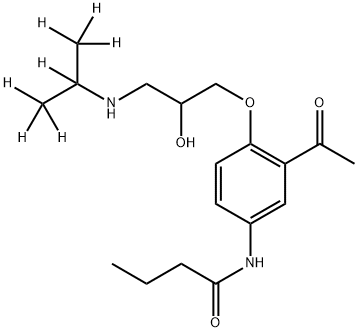Acebutolol-d
7 is intended for use as an internal standard for the quantification of acebutolol by GC- or LC-MS. Acebutolol is an antagonist of β
1-adrenergic receptors (β
1-ARs; K
i = 125 nM).
1 It is selective for β
1- over β
2-ARs (K
i = 7,070 nM).
In vivo, acebutolol decreases isoprenaline-induced tachycardia and diastolic hypotension in cats (ED
50 = 0.09 mg/kg for both).
2 Acebutolol (12.5, 25, and 50 mg/kg) inhibits ouabain-induced arrhythmias in rabbits, as well as protects against chloroform-induced ventricular fibrillation in mice (ED
50 = 0.067 mg/kg).
3 Formulations containing acebutolol have been used in the treatment of angina and irregular heartbeat.
1. Tsuchihashi, H., Nakashima, Y., Kinami, J., et al. Characteristics of 125I-iodocyanopindolol binding to β-adrenergic and serotonin-1B receptors of rat brain: Selectivity of β-adrenergic agents Jpn. J. Pharmacol. 52(2),195-200(1990).
2. Basil, B., Jordan, R., Loveless, A.H., et al. β-Adrenoceptor blocking properties and cardioselectivity of M & B 17,803A Br. J. Pharmacol. 48(2),198-211(1973).
3. Basil, B., Jordan, R., Loveless, A.H., et al. A comparison of the experimental anti-arrhythmic properties of acebutolol (M and B 17,803), propranolol and practolol Br. J. Pharmacol. 50(3),323-333(1974).

